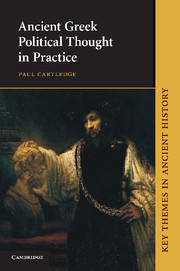Book contents
- Frontmatter
- Contents
- Preface
- Acknowledgements
- Timeline
- CHAPTERS AND NARRATIVES
- 1 Meaning in context: how to write a history of Greek political thought
- 2 The Greek invention of the polis, of politics and of the political
- Narrative I The prehistoric and protohistoric Greek world, c. 1300–750 BCE
- Narrative II The archaic Greek world, c. 750–500 BCE
- Narrative III The classical Greek world I, c. 500–400 BCE
- Narrative IV The classical Greek world II, c. 400–300 BCE
- Narrative V The Hellenistic Greek world, c. 300–30 BCE
- Narrative VI ‘Graecia capta’ (‘Greece conquered’), c. 146 BCE – CE 120
- 10 The end of politics? The world of Plutarch, c. CE 100
- 11 The Greek legacy and democracy today
- APPENDIX I Selected texts and documents
- APPENDIX II The ‘Old Oligarch’: a close reading
- Bibliographical essay
- References
- Index
11 - The Greek legacy and democracy today
Published online by Cambridge University Press: 05 June 2012
- Frontmatter
- Contents
- Preface
- Acknowledgements
- Timeline
- CHAPTERS AND NARRATIVES
- 1 Meaning in context: how to write a history of Greek political thought
- 2 The Greek invention of the polis, of politics and of the political
- Narrative I The prehistoric and protohistoric Greek world, c. 1300–750 BCE
- Narrative II The archaic Greek world, c. 750–500 BCE
- Narrative III The classical Greek world I, c. 500–400 BCE
- Narrative IV The classical Greek world II, c. 400–300 BCE
- Narrative V The Hellenistic Greek world, c. 300–30 BCE
- Narrative VI ‘Graecia capta’ (‘Greece conquered’), c. 146 BCE – CE 120
- 10 The end of politics? The world of Plutarch, c. CE 100
- 11 The Greek legacy and democracy today
- APPENDIX I Selected texts and documents
- APPENDIX II The ‘Old Oligarch’: a close reading
- Bibliographical essay
- References
- Index
Summary
It has been said that democracy is the worst form of government, except all those other forms that have been tried from time to time.
(Winston Churchill, speech of 11 November 1947 to the House of Commons)Nous vivons à une époque où l'on peut tout discuter mais, étrangement, il y a un sujet qui ne se discute pas, c'est la démocratie.
(José Saramago [Nobel laureate 1998], interview in Le monde, 24 November 2006)After thesis and antithesis, what else but synthesis? If there has been a single underlying theme running through this book, it is the difference – or, rather, the alterity (otherness) – of the Greek city. Whatever the ancient Greek polis and its politics were, they were emphatically not ‘liberal’ as that term is today understood in mainstream Western political theory. Any attempt to detect even a quasi-metaphorical ‘liberal temper’ in Greek politics is deeply misguided (Havelock 1957; cf. Brunt 1993: 389–94); but does that inevitably entail that the ancient Greek political experience has nothing to teach us today?
A reading of Nietzsche in sombre mood would indeed suggest so: ‘The classicist is the great skeptic in our cultural and educational circumstances’, since ‘if we understand Greek culture, we see that it is gone for good’ (‘Wir Philologen’, as cited by Williams 1993: 171 n. 10; emphasis in original).
- Type
- Chapter
- Information
- Ancient Greek Political Thought in Practice , pp. 131 - 137Publisher: Cambridge University PressPrint publication year: 2009



